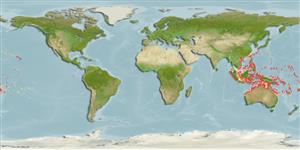Environment: milieu / climate zone / depth range / distribution range
Ecologia
marinhas associadas(os) a recifes; intervalo de profundidade 0 - 45 m (Ref. 9710). Tropical; 30°N - 18°S, 97°E - 150°W
Indo-Pacific: Christmas Island in the eastern Indian Ocean to the Line Islands, north to the Ryukyu Islands, south to Rowley Shoals and the northern Great Barrier Reef; throughout Micronesia. Replaced by Chaetodon guttatissimus in the Indian Ocean (Ref. 37816).
Tamanho / Peso / Idade
Maturity: Lm ? range ? - ? cm
Max length : 12.0 cm TL macho/indeterminado; (Ref. 9710)
Espinhos dorsais (total): 13 - 14; Raios dorsais (total): 22-25; Espinhos anais 3; Raios anais : 17 - 18. Overall color is brownish yellow with vertical rows of spots forming bands on the upper portions of the sides. A black-edged orange bar runs across the eye. The posterior edge of the caudal fin is transparent. Caudal peduncle is bright orange (Ref. 4855). Snout length 2.7-4.1 in HL. Body depth 1.6-1.8 in SL (Ref. 90102).
Common in coral rich areas and clear waters of lagoon and seaward reefs. Sometimes found on outer subtidal reef flats (Ref. 1602). Juveniles secretive (Ref. 48636). Feed on filamentous algae, corals, and benthic invertebrates. Often in pairs during breeding (Ref. 205), monogamous (Ref. 52884). Oviparous (Ref. 205). Occasionally hybridize with C. pelewensis in the southern part of its range (Ref. 9710). Minimum depth reported taken from Ref. 128797.
Ciclo de vida ou comportamento de acasalamento
Maturidade | Reprodução | Desova | Ovos | Fecundidade | Larvas
Distinct pairing (Ref. 205). Monogamous mating is observed as both obligate and social (Ref. 52884).
Randall, J.E., G.R. Allen and R.C. Steene, 1990. Fishes of the Great Barrier Reef and Coral Sea. University of Hawaii Press, Honolulu, Hawaii. 506 p. (Ref. 2334)
Status na Lista Vermelha da UICN (Ref. 130435)
Ameaça para os humanos
Harmless
Uso pelos humanos
Pescarias: pouco comercial; Aquário: Espécies comerciais
Mais informação
ReferênciasAquaculturaPerfil para aquaculturaEstirpesGenéticaElectrophoresesHereditariedadeDoençasProcessamentoNutrientsConversão de massa
Ferramentas
Relatórios especiais
Baixar XML
Fontes da internet
Estimates based on models
Preferred temperature (Ref.
123201): 26 - 28.9, mean 27.8 °C (based on 344 cells).
Índice de diversidade filogenética (Ref.
82804): PD
50 = 0.5000 [Uniqueness, from 0.5 = low to 2.0 = high].
Bayesian length-weight: a=0.02291 (0.01133 - 0.04632), b=3.00 (2.83 - 3.17), in cm total length, based on LWR estimates for this Genus-body shape (Ref.
93245).
Nível Trófico (Ref.
69278): 3.4 ±0.6 se; based on diet studies.
Resiliência (Ref.
120179): Elevada, tempo mínimo de duplicação da população menor que 15 meses (Preliminary K or Fecundity.).
Fishing Vulnerability (Ref.
59153): Low vulnerability (10 of 100).
Nutrients (Ref.
124155): Calcium = 130 [66, 208] mg/100g; Iron = 0.967 [0.557, 1.662] mg/100g; Protein = 18.6 [17.4, 19.8] %; Omega3 = 0.129 [0.073, 0.224] g/100g; Selenium = 36.7 [18.9, 71.1] μg/100g; VitaminA = 49.2 [14.2, 174.1] μg/100g; Zinc = 1.65 [1.09, 2.43] mg/100g (wet weight);
